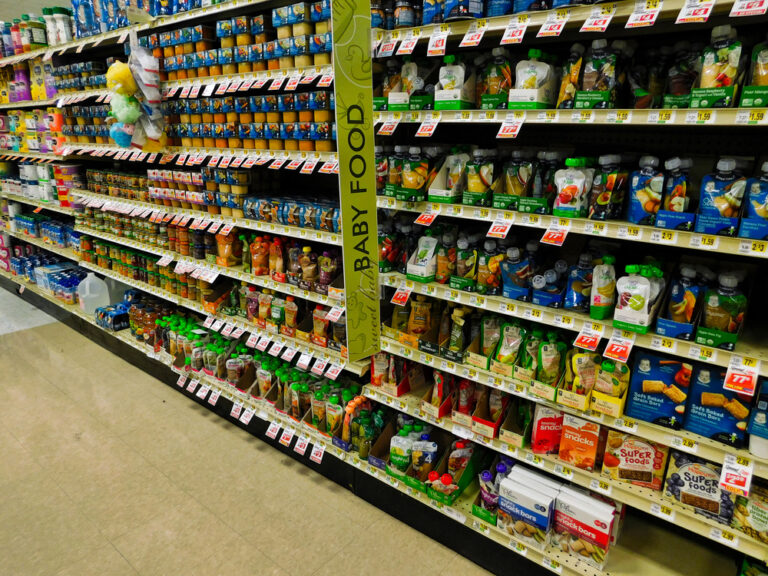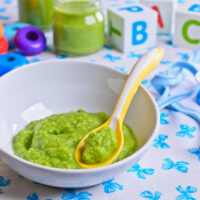We aren’t here to debate whether or not homemade or store-bought baby food is best; both have their pros and cons. I ended up using both for my infants. I liked the creativity of making food at home, but also appreciated the convenience of not always needing to. The best baby foods are those that will provide the nourishment that your baby needs (source). As discussed in our Best Baby Foods article, most manufacturers provide “stages” for their baby food products.
Stage 1 foods tend to come in smaller volumes, and are soft purees, whereas Stage 3 foods often have chunky textures. Although labels will specify a recommended age for each stage, it is important to know that staging should be based on an infant’s developmental readiness. For example, some foods are labeled “6 months, stage 2” which is inappropriate for infants who have been solely breastfed until that age.
Initially, it is best to offer single foods that are finely pureed. This allows the infant to learn proper swallowing technique and prevents choking or aspiration. By introducing only one new food every three to five days, if an allergic reaction develops, you will easily know the cause (source). Here’s a closer look at some of the top baby food choices.
Please note: some infant foods are more commonly available in tubs or pouches instead of jars. This has made shipping, manufacturing, and sometimes, even feeding, easier.
Best Baby Food Jars, Tubs, or Pouches
Plum Organics Baby Food has single food options, and blends with added seasonings such as cinnamon or mint. Gerber Baby Food offers just the basic foods (i.e. bananas taste like bananas).
Plum Organics Baby Food
Plum Organics Baby Food, like most brands, offers three food stages. I particularly like the addition of mild seasonings which expand your little one’s palate.
Stage 1 foods are basic, single food purees, yet some of these are seasoned. For example, there is butternut squash with cinnamon, or sweet peas with mint.
For stage 2 options, a wider variety of flavors is available. Plum Organics creates some food blends based on color such as the White Blend (cauliflower, apples, and leeks), and Red Blend (apples, beets, and red bell peppers). These pack a lot of flavor and a nutritional punch. You’ll also find Second Blends that include grains such as coconut rice, quinoa, and amaranth.
Stage three meals offer an even greater variety of spices and proteins. For example, one such meal is quinoa with leeks, chicken, and tarragon.
Note: some of the grain meals may require preparation (i.e. addition of hot water to cook the grains).
Happy Baby Organic Baby Food
A name like Happy Baby just sounds like it would provide what’s best for your little one. Happy Baby Organic Baby Food comes in three stages of foods to give your little one as he or she grows.
Stage 1 includes oatmeal, brown rice, and multi-grain cereals that are fortified with iron, important for brain development (source). They also contain probiotics to promote a healthy digestive tract. In addition to cereals, there are traditional fruit puree pouches.
Stage 2 options are fruit and vegetable blends that further test your infant’s tastebuds. Happy Baby has several product lines, giving parents many choices. For example, the Clearly Crafted meals provide many unique flavors. As an added bonus, the label provides information about where the ingredients are sourced.
Finally, stage 3 meals offer proteins and more texture. You’ll find nutritious ingredients such as salmon, quinoa, and amaranth that are ideal for maturing digestive systems and palates.
Sprout Organic Baby Food
Sprout Organic Baby Food has a wide variety of blends for infants who have graduated from single foods. The company no longer sells its previous Stage 1 sweet potato, mango, prune, or peaches pouches. However, Sprout is a great choice for babies who are ready for more complex flavors.
Stage 2 blends include combinations of fruits and vegetables with a protein or grain. For example, there is apple with blueberries, and a pear, spinach, kiwi, pea blend. Grain blends are also available in this product group, including those with fruits, veggies, beans, and spices like cinnamon. There are also some baby yogurts and yogurt blends for added calcium and protein.
Stage 3 options are chunkier purees. Many have wholesome grains or plant-based proteins such as lentils, chickpeas, and beans. Others are blended with poultry or meats. For example, babies can enjoy the market vegetables with pear and turkey pouch, or the harvest vegetables with apricots and chicken.
Mama Bear Organic Baby Food
The Mama Bear Organic Baby Food is not only affordable, but also provides tons of options for healthy babies food on-the-go. These products come in single food tubs or pouches of blended flavors. If the whole container is not consumed, the remainder must be refrigerated (true for any baby food). Mama Bear’s offerings provide lots of nutrients to keep your baby healthy.
The organic vegetables are packaged with 12 servings per box, and three tubs of each food type. They are made in America without GMOs or artificial ingredients. Instead, you just get a perfect stage 2 food for babies 6 to 8 months old. The tubs and pouches are also BPA-free.
Options include butternut squash, carrots, mixed veggies, and sweet potato. You may also choose ones that are blended with fruit once your baby has tried all of the single vegetables. Mama Bear is the perfect portable baby food because it has a lid for storage, and a small size that is easy to pack into a diaper bag.
Unfortunately, the containers are not very sturdy which allows the price to remain low. I suggest packing them in a separate compartment of your bag to avoid messes.
Gerber Organics Jarred Baby Food
The Gerber line is one that has been trusted by parents for decades. I have already stated my preference for organic baby foods and Gerber Organics Jarred Baby Food is a great choice when you are on a budget.
The Stage 1 Gerber line has single foods such as banana, apple, butternut squash, carrots and peas. These jars or tubs are great for infants who are just beginning to eat pureed foods. These flavors make it easy for your little one to develop their palate, and discover what they enjoy.
Doctors often recommend cereal as one of the first baby foods. Due to concerns about arsenic contamination of rice, oat and wheat cereals are preferred. Once it is clear that cereal alone is well tolerated, it can be combined with with fruit or vegetable purees from the Stage 1 line. Gerber fruits and vegetables are very true to the actual flavor (as they should be). I even liked the jarred peaches!
The Gerber Stage 2 grains come pre-blended with fruits and vegetables. A wider variety of fruits and veggies are also available, including açai berry, spinach, or zucchini. Most of these options are packaged in pouches.
Stage 3 Gerber Organics increase the food types by adding cheese or yogurt to some of the blends. Kale, figs, or spices may be added to help expand your baby’s palate. This product line is thicker and chunkier, so it is important to wait until your baby is able to chew before serving them.
Earth’s Best Organic Baby Foods
Earth’s Best Organic Baby Foods is a well-trusted brand for organic baby products, and their food line does not disappoint. It provides options for the few years of life, including organic meals for toddlers.
Stage 1 offers whole grain cereals and single food jars. In addition to rice and oatmeal, there is multi-grain variety. The jarred baby foods include basic flavors such as sweet potatoes, peas, pears, and bananas.
Stage 2 options have chunkier textures and food blends. Some even include turkey or chicken. Earth’s Best is a good choice for parents of picky eaters who aren’t excited about trying new foods.
Finally, stage 3 has several ready-to-go meal options that are great for introducing your little one to cheese or pasta. For example, you will find chicken and star pasta, or spaghetti with cheese.
Comparing Commercial Baby Food Options
The table below compares only the recommended products on this page. A low or high Price means it is low or high compared to the other products listed. The Popularity Score reflects how often readers click on and buy the product. The Quality Score is our assessment of the overall performance and satisfaction with the product compared to others in the table.
| Plum Organics Baby Food | 9.4 | 9.6 | 31.23 |
| Happy Baby Organic Baby Food | 8.4 | 9.6 | 31.08 |
| Earth's Best Organic Baby Foods | 3.9 | 9.6 | 17.90 |
| Sprout Organic Baby Food | 9.7 | 9.4 | 17.48 |
| Mama Bear Organic Baby Food | 4.5 | - | 17.23 |
| Gerber Organics Jarred Baby Food | 9.9 | 9.6 | 9.04 |
FAQs – Store Bought Baby Food
Should I make baby food or buy it?
The decision to make baby food or buy it from the store is a matter of preference.
There are several benefits to making your own baby food. It costs less and avoids the use of preservatives. It is also more eco-friendly because there is less processing, and the packaging can be re-used.
However, preparing baby food isn’t an option for every parent, and store-bought products are an easy way to provide a wide variety of fruits, vegetables, and other nutritious foods. There is also the risk of bacterial contamination when homemade food is not prepared in a safe way. It is often helpful to use sterilized baby food-making equipment, as a preventative measure. In addition, homemade baby food has a limited shelf-life due to the lack of preservatives. It should, therefore, be stored in the freezer until ready to thaw and use. When making your own baby food, it can also difficult to get to the right texture. This may result in choking or gagging among infants who have difficulty with thicker, chunkier textures. And then, there is the question of naturally-occurring nitrites and nitrates. Levels are highest in certain dark green leafy vegetables and beets. Amounts of these contaminants tend to be lower in store bought baby foods (source). However, the verdict is still out on whether or not nitrites and nitrates are harmful or beneficial (source).
The best option is to choose what works for you and your baby. It is ok to make baby food when it is convenient, but buy commercial ones at other times; it is entirely up to you. If you are still undecided, here’s a closer look at the pros and cons of jarred baby food vs. homemade baby food.
What should I look for when buying baby food?
When choosing baby food jars, tubs, or pouches, flavor or texture is most important. Looking at the stages, the earlier ones usually have a smooth texture and simple flavors. Later stages are intended for more advanced palates, and babies who have begun to chew.
As a parent, it is very important for me to know what is going into my little one’s body. As a personal preference, I prefer baby foods made with organic fruits and vegetables. It gives me peace of mind to know that there are no pesticides or contaminants in my baby’s food.
As with all foods, look for superfoods or those that offer a lot of nutrition. Never buy baby food that is high in salt or sugar (source).
Do the stages matter?
Baby food manufacturers use staging to reflect the amount of food processing, and type of ingredients. Stage 1 foods are typically single food options that are finely pureed. They are designed for infants who are just beginning to eat ‘first foods,” between ages four to six months old. Infant cereals are included in this category. Stage 2 foods are for infants who have completed the single food options, and can now tolerate blends. Those who are exclusively breastmilk or formula fed for the first six months, however, will not be ready for stage 2 foods until around 8 months old. Proteins are often included such as legumes, fish, poultry, and meats. Although absent from most store-bought baby foods, the American Academy of Pediatrics and the American Academy of Allergy, Asthma, and Immunology recommend introducing nuts between ages four to six months.
Otherwise, stages are intended to describe the textures of the baby food. Stage 1 is generally a thick liquid, while stages 2 and 3 are better for more experienced eaters. Some stage 2 products have a thicker pureed consistency, and stage 3 foods are usually chunky. Think of this last stage as the equivalent of giving your baby mashed table foods.












